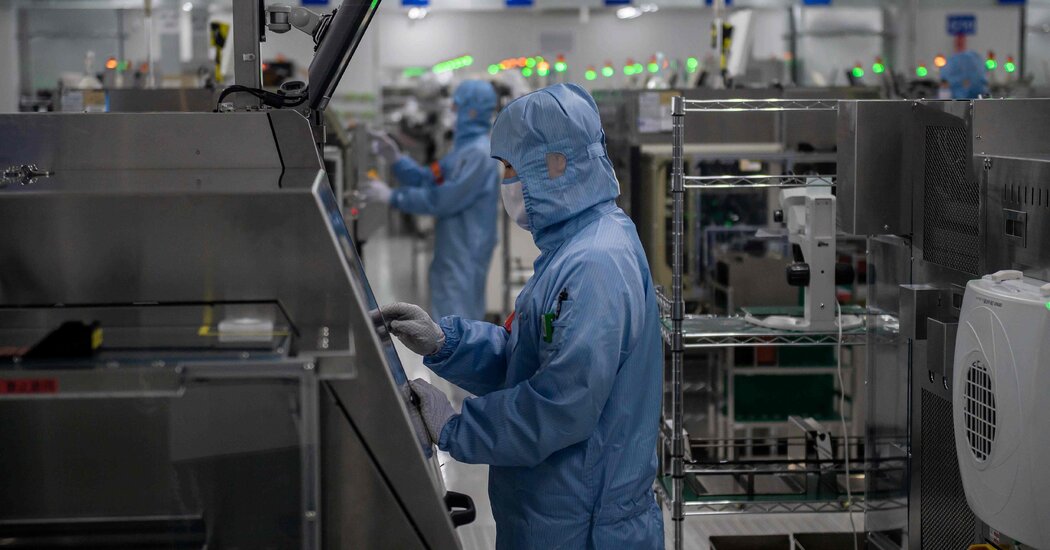
WASHINGTON — The Senate on Tuesday moved toward passing an expansive industrial policy bill to counter China’s technological and manufacturing dominance, voting to advance legislation that includes more than $52 billion in subsidies for companies that build semiconductors in the United States.
The 64-to-32 vote was a significant step for a yearslong, bipartisan effort to forge a long-term American strategy to compete with China through enormous investments in domestic manufacturing and scientific research and development that had appeared to sputter in recent weeks.
Seventeen Republicans voted to advance the bill, breaking with their party’s longstanding skepticism of government intervention in the markets and instead arguing that a more activist role was necessary to bolster national security and help American companies compete with a rising geopolitical rival.
“With this bill, we will reawaken the spirit of discovery, innovation, and optimism that made America the envy of the world,” said Senator Chuck Schumer, Democrat of New York and the majority leader, who co-wrote the bill.
Enactment of the legislation, which could happen as early as this week, is considered a critical step to strengthening America’s semiconductor capabilities at a time when the share of modern manufacturing capacity in the United States has plummeted to 12 percent. That has left the nation increasingly reliant on foreign countries amid a chip shortage that has sent shock waves through the global supply chain.
The bill, for which chip manufacturers lobbied heavily, is expected to pave the way for the construction of new factories across the country and, along with that, an estimated tens of thousands of jobs.
In Ohio, a politically competitive state, it should mean that Intel will build as many as eight factories instead of two at its site in Licking County, adding more jobs at the plant and providing a major boost to the construction and steel industries. Similar stories are expected to play out in Texas, Arizona, Idaho and New York, as chip companies build out new sites or expand existing factories.
The bill would also authorize roughly $250 billion for research and development of critical technologies. Written by a New Yorker and a Midwesterner — Mr. Schumer and Senator Todd Young, Republican of Indiana — it seeks to concentrate those investments in once-booming industrial hubs to revitalize communities hollowed out by corporate offshoring.
In addition to authorizing $100 billion over five years for the National Science Foundation, the legislation sets up a new technology directorate responsible for ensuring that advances in basic research are applied in real-world technologies.
Those measures appear to be a belated answer to Beijing’s “Made in China 2025” project, a key element of President Xi Jinping’s strategy for mastering critical technologies and making China independent of the West.
8 Signs That the Economy Is Losing Steam
Worrying outlook. Amid persistently high inflation, rising consumer prices and declining spending, the American economy is showing clear signs of slowing down, fueling concerns about a potential recession. Here are other eight measures signaling trouble ahead:
Like “Made in China,” the legislation focuses on semiconductors as a core technology, but also puts billions into research and development of technologies for the future. The list was familiar: artificial intelligence, robotics, quantum computing, battery technology, biotechnology and other areas that appear central to future competitiveness.
It also stipulates that chip manufacturers that take the federal funds and tax subsidies provided by the legislation cannot expand existing factories or build new ones in countries including China and Russia, in an effort to curtail advanced chip manufacturing in nations that present a national security concern.
President Biden sought to add a final push for the bill himself, convening a virtual conference with corporate chief executives and labor leaders on Monday to highlight the benefits of the legislation. The president, who is recovering from Covid-19 and beamed in over video from the White House residence where he is isolating, said the measure was critical to keeping the United States the most economically competitive nation in the world.
“The CHIPS Act is going to advance the nation’s competitive and our technological edge,” he said. “Congress must pass this bill as soon as possible so it gets to my desk and we can sign it and get moving.”
Few lawmakers objected, citing the urgency of bolstering the nation’s chip manufacturing capabilities and reducing its reliance on semiconductors from foreign countries, especially Taiwan.
Senator Bernie Sanders, independent of Vermont, was the only lawmaker caucusing with Democrats to oppose the bill. He argued that chip companies’ extensive lobbying campaign, in which they threatened to take their business abroad if Congress did not pass the legislation, was tantamount to “extortion.”
“Industrial policy, to me, means cooperation between the government and the private sector,” Mr. Sanders said. “It does not mean the government providing massive amounts of corporate welfare to profitable corporations without getting anything in return.”
Understand Inflation and How It Impacts You
The vote was a comeback of sorts for the ambitious legislation, which just weeks ago appeared at risk of being whittled down to a one-time injection — albeit a sizable one — of federal funds into a single industry with few restrictions. That would have been a final blow to the effort to enact long-term, forward-looking legislation to counter China.
The first headwinds came as the legislation worked its way through the Senate, when lawmakers stuffed it with parochial projects in a bid to win broader support, significantly increasing its size.
Both Democrats and Republicans in the House balked, arguing that the Senate bill was overly prescriptive in laying out which technologies to invest in. Instead of passing a parallel version, the House passed a series of discrete science and technology bills.
It was not until eight months later that House Democrats pushed through a broader version similar to the Senate bill, on a mostly party-line vote that attracted the support of only one Republican, setting up a negotiation to resolve differences between the two chambers. The talks were sprawling, including 107 lawmakers — 20 percent of all members of Congress — who were tasked with striking compromises on more than 1,100 independent measures spanning trade, foreign relations and industrial policy that had to be reconciled, all while being buffeted by an onslaught of lobbying from industry players.
By the time the group had its first meeting in May — 11 months after the Senate first passed its bill — chip executives and their allies in the auto, medical and defense industries had grown anxious about when or if their federal incentives would materialize.
By June, private frustration from chips companies turned into public yowling, as executives pointed out that European countries as well as Japan, India and South Korea had already passed similar subsidies while Congress had been bickering. They threatened to take their business to other nations, where it is generally 25 to 50 percent cheaper to build facilities than in the United States.
Lawmakers, prodded by members of Mr. Biden’s cabinet, listened, and Mr. Schumer quickly moved to bring up a narrow version of the legislation centered on the subsidies and tax credits for chip manufacturers.
But a last-minute effort by Mr. Young to restore the critical investments in manufacturing and technology was successful, after he was able to secure the support of 15 of his Republican colleagues. Mr. Schumer agreed to add those elements back in.
Also tucked into the legislation was an authorization for $19 million to address threats to the Supreme Court.
Peter Baker and David E. Sanger contributed reporting.




